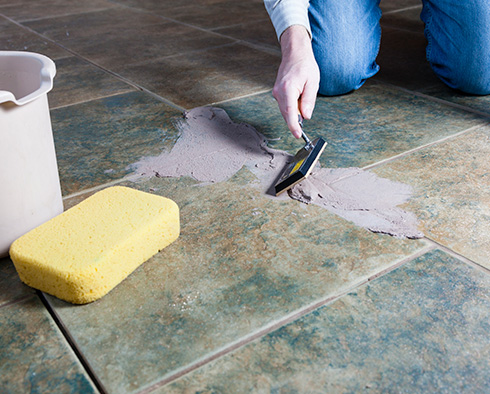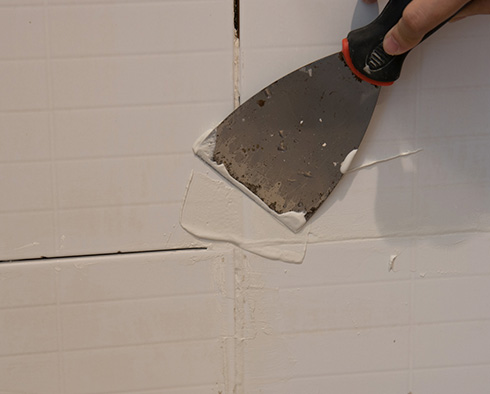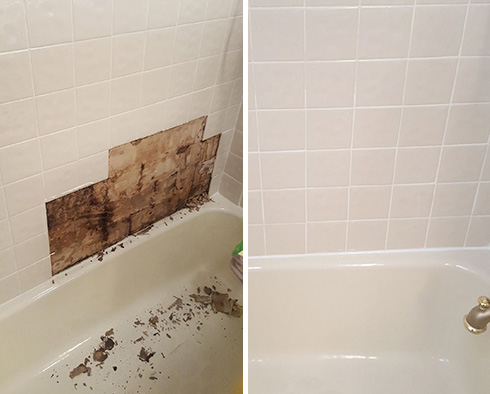This Marble Bathroom in Greenwich, CT Needs a Stone Honing to Remove the Etch Marks
May 02, 2016
A decadent marble bathroom is a terrible thing to ruin with acidic cleaners. Unfortunately, this Greenwich homeowner had no idea what she was doing to her floor every time she cleaned it with her favorite all-natural cleaner. Each acid bath she gave the luxurious, marble-lined steps to her Jacuzzi tore a deep layer off the top of the seal that had been protecting her marble. Weekly cleaning sessions that appeared to momentarily brighten the floor gave way to a foggy appearance. At this point, her seal was completely destroyed – all that was left was for the acids to begin their attack on the marble itself. That's when etching began.Do you use acidic cleaners on your marble, limestone, or travertine floor? Take a look at the video below to see the damage that you might cause. This damage will be easily fixed by Sir Grout of Greater Fairfield County, as we offer a convenient Greenwich stone honing service.
The truth is, pH is very important for cleaning. If a cleaner falls in the acidic range, it will more often than not damage your hard surfaces. When calcite-based stones such as marble, limestone, and travertine are exposed to acids, the calcium in the stone reacts with the acid, breaking down into another chemical. It's this chemical reaction that causes the discoloration and deterioration of the stone itself. This damage to the surface is permanent – in order to restore the marble, the layer that was damaged by the chemicals must be honed.
In the cleaner world, the biggest offender is citric acid, a chemical found most commonly in all-natural cleaners. If your cleaner contains citric acid as the active ingredient, or if you test the pH of your cleaning product with pH test strips, you can discover whether or not it is in the proper range to not react with your stone. A pH of 7 is neutral, which is the ideal pH for a cleaning product.
Even if your cleaning product is pH-neutral, it may not be ideal for cleaning your stone. Products that are soapy leave a lot of residue behind, and that residue, or soap scum, acts like a magnet for dirt. Soap cleans well because of its ability to attract dirt – and that may work great to remove dirt from clothing or skin, but on a hard surface, it leaves behind a layer of residue that, when dry, continues to attract the dirt! So while your floor may seem momentarily clean, when you finally walk on it, everything that is tracked on your shoes immediately adheres to your floor. Not cool, and definitely not clean! For the germaphobes out there, it may seem like a cruel twist of fate that soap itself can get dirty, and leave your home even dirtier than it was originally.
We recommend using a pH-neutral soap-less floor cleaner to prevent damage like you see in the above video from happening. You can prevent a lot of damage to your sealed floor and stone by properly cleaning. Also, do not clean with vinegar, as it is also very acidic and damaging to your hard surfaces as well.
If you need help identifying etch marks, there's a simple way to tell. Do they look like water spots on your floor, but when you attempt to wipe or polish them, they won't go away? If so, you have etch marks! This damage may occur to your seal, which could be ruining the look of your stone if it is polished, or the damage could have begun eating away at your stone. Whatever you do, do not leap to replacing your luxurious marble or travertine. It can be fixed through honing and polishing the stone. When we remove a layer of stone, we buff it out. The process is similar to sanding wood, or buffing out your nails. Then, we use a fine grit to bring the stone to the level of polish and shine you desire.
Does your floor have etch marks? If you're not sure, we offer a free evaluation. Give us a call at (203) 763-1332 and we'll be happy to take a look at your floors for free!
If you found this article helpful then let us know in the comments section below. Likewise, feel free to share it using the share options below. Want us to cover another topic of your interest pertaining to Hard Surface Restoration? If so, then like us and follow us on social media, and post to any of our social media profiles the topic you'd like us to discuss: Facebook Sir Grout of Greater Fairfield County, Instagram @sirgroutfairfield, and Twitter @SirGrout.







